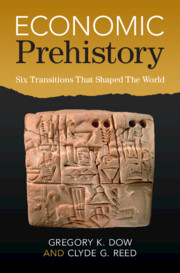Book contents
- Economic Prehistory
- Economic Prehistory
- Copyright page
- Dedication
- Contents
- Figures
- Tables
- Preface
- Acknowledgments
- Abbreviations
- Part I Prologue
- Part II Sedentism and Agriculture
- Part III Inequality and Warfare
- 6 The Transition to Inequality
- 7 Warfare between Egalitarian Groups
- 8 Warfare between Elite Groups
- Part IV Cities and States
- Part V Epilogue
- References
- Author Index (Abridged)
- Subject Index
7 - Warfare between Egalitarian Groups
from Part III - Inequality and Warfare
Published online by Cambridge University Press: 10 February 2023
- Economic Prehistory
- Economic Prehistory
- Copyright page
- Dedication
- Contents
- Figures
- Tables
- Preface
- Acknowledgments
- Abbreviations
- Part I Prologue
- Part II Sedentism and Agriculture
- Part III Inequality and Warfare
- 6 The Transition to Inequality
- 7 Warfare between Egalitarian Groups
- 8 Warfare between Elite Groups
- Part IV Cities and States
- Part V Epilogue
- References
- Author Index (Abridged)
- Subject Index
Summary
The subject of early warfare is controversial: Some authors argue that it has been prevalent throughout human biological evolution while others argue that it arose more recently. We study warfare over land among internally egalitarian groups, which were the norm for most of human prehistory. Archaeological evidence for Europe and southwest Asia indicates that warfare was rare in the Upper Paleolithic, common in the Mesolithic, and widespread in the Neolithic. This suggests an increase in the frequency of warfare along the trajectory from mobile to sedentary foraging, and from sedentary foraging to agriculture. We constructs a model in which two groups occupy sites with possibly different productivities, and each group must decide whether to attack the other. If either group attacks, the probability of one group seizing the land of the other depends on the sizes of the two populations. If neither attacks, there is peace. We show that when individual agents can freely migrate between sites before group decisions about warfare are made, a stable equilibrium with warfare cannot occur. However, a model involving costly individual migration and Malthusian population dynamics can generate warfare if climatic or technological shocks alter the relative productivities of the sites.
Keywords
- Type
- Chapter
- Information
- Economic PrehistorySix Transitions That Shaped The World, pp. 272 - 305Publisher: Cambridge University PressPrint publication year: 2023



